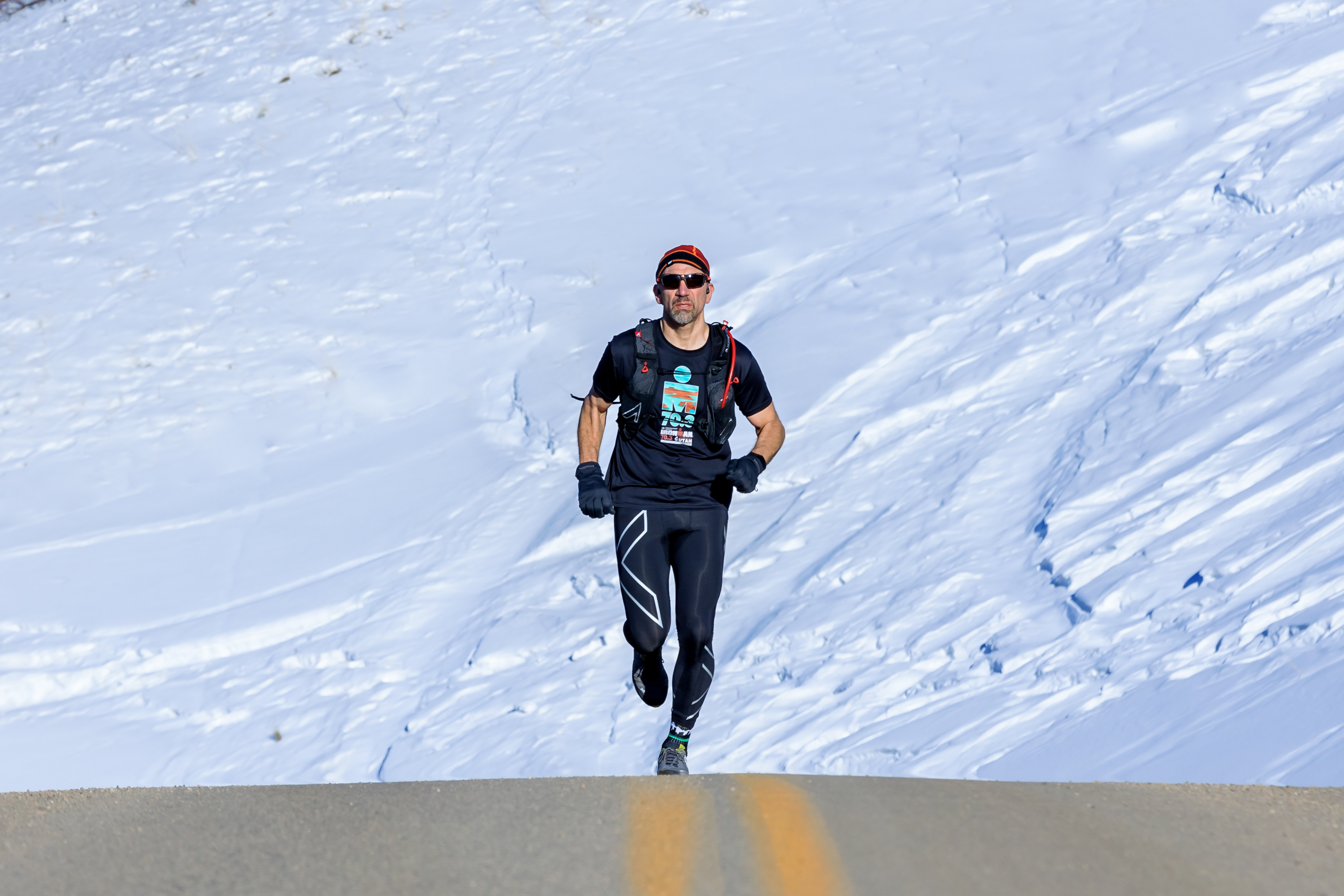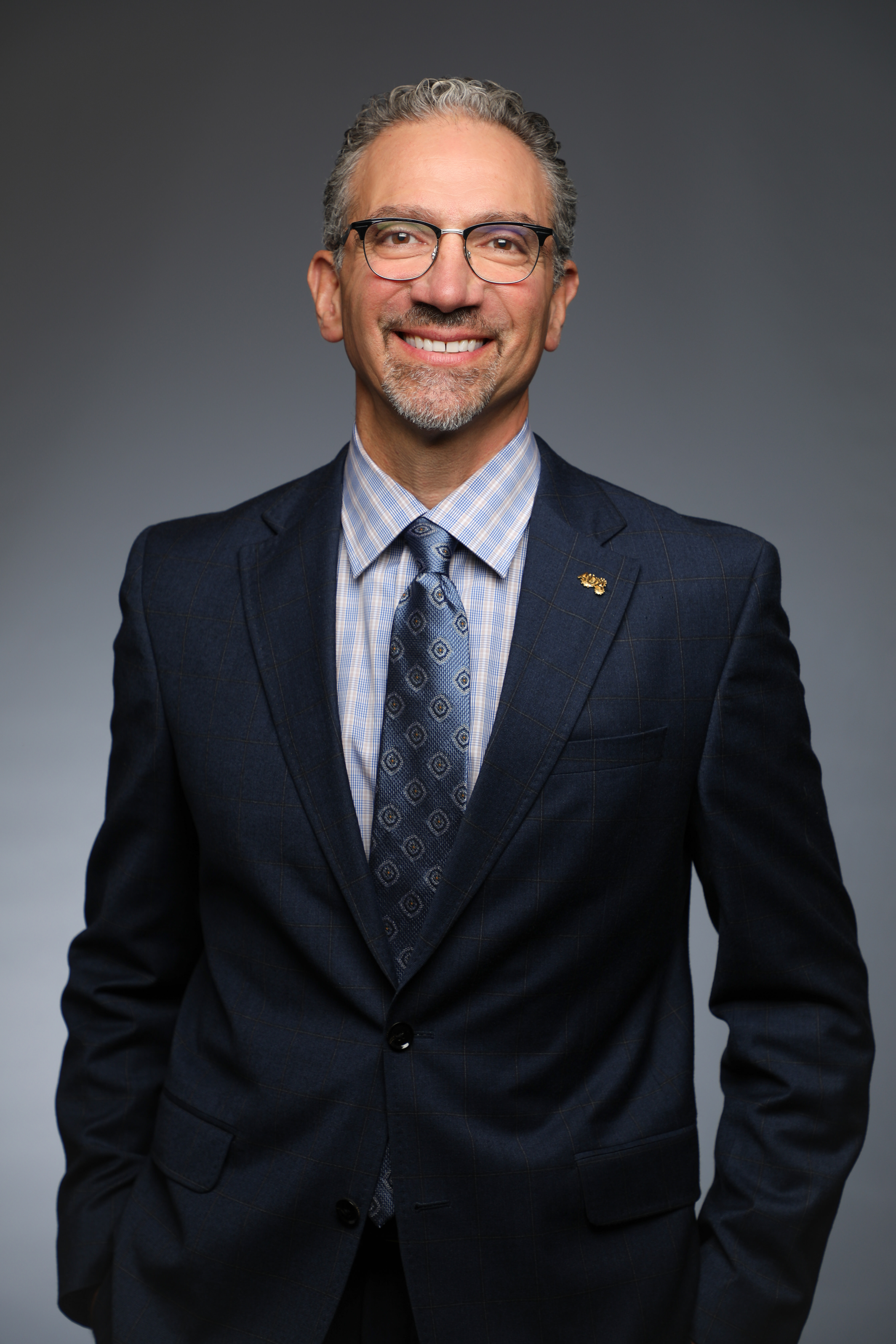Showing up as his best self
Brett Kessler, D.D.S., to become 161st president of ADA


It’s 5 a.m. on any given morning. Dr. Brett Kessler’s alarm rings.
There’s a grunt, a moan. He gets up, sits down in his home office and does a guided meditation while he’s sipping his coffee. The audio meditation usually has a topic, which will lead Dr. Kessler to write in his journal what he thought about and what insights he gathered. There are some days he skips the stationary meditation, turning toward another form for him: running.
“I’m an endurance athlete, and I’ve done some crazy endurance races over the years, so there’s a lot of times I’ll be training, and I’ll go for an early morning run or early morning bike ride or swim and I’ll get my meditation in that way,” said Dr. Kessler, who lives in Denver. “And sometimes I’ll get these insights, and I’ll have my phone with me, and I’ll start typing in with my thumbs the thoughts I had and then come back to it later.”
It’s a daily ritual that has become necessary for Dr. Kessler, a recovering addict. As he’s made his way up the mountain of organized dentistry, Dr. Kessler has spoken very candidly about his addiction journey. He’s at the top of the mountain now, ready to assume his role as 161st president of the American Dental Association on Oct. 22 at the House of Delegates in New Orleans. He’ll also celebrate 26 years of sobriety in October.
Rock bottom to recovery
Dr. Kessler, 56, grew up in Glenview, Illinois — a suburb of Chicago — and attended the University of Iowa for his undergraduate degree, majoring in biomedical engineering with the intent of going to medical school.
“I studied for my MCATs the entire summer, and I remember standing at the mailbox, ready to mail my application, and I tore up the application. I didn’t want to go to medical school,” Dr. Kessler said.
Let’s back up.
College was when Dr. Kessler developed a substance abuse problem, which took over his life. He was drunk and high a lot, and he said the decision not to go to medical school was mostly out of immaturity and defiance to his parents.
“I didn’t want to deal with people dying, and I didn’t know really what I was getting into,” Dr. Kessler said. “But really, I was just kind of lost in life at that time.”
A friend of his who was in dental school had told him he would probably do well as a dentist, considering his engineering background. And the girls were cute.
“And I know I shouldn’t say that, but that was part of my driving decision, and I ended up doing pretty well in dental school, and the girls were cute,” Dr. Kessler said. “That’s where I met my wife, and we were classmates, and we started dating our first year and got married our fourth year.”
Dr. Kessler started at the University of Illinois Chicago College of Dentistry with the intention of not using drugs anymore, but he still drank heavily with his classmates. By his third year, he found drugs again.
“I went into dental school with a substance abuse problem, and I graduated with a worse one. But I never practiced drunk or high. I’m proud of that. But I can’t always say I practiced at my best,” said Dr. Kessler, who, despite his struggles, ended up graduating in the top 20% of his class.
After a general practice residency at Northwestern Memorial Hospital in Chicago, Dr. Kessler moved to Michigan to be with his wife, Gina, who was pursuing orthodontics at the University of Michigan. He was using a lot of drugs by then, and his life had spun out of control. Dr. Kessler remembered a presentation from an addiction medicine specialist during his residency who pointed out that every state had a wellbeing hotline dentists could call to get help with dignity while maintaining their license. He called and ultimately went to rehab but still didn’t think he had a problem.
Dr. Kessler went back to his old ways, and 14 months after leaving his first rehab stint, he hit rock bottom. He returned to rehab and has been sober since October 1998.
“The brain is a funny thing, and with addiction and all mental illnesses, it tells you you don’t have it, and it tells you you could be self-sufficient,” Dr. Kessler said. “And unfortunately, that didn’t work, so I had to go back to get a tune up in rehab and get more tools. And then I was finally humbled enough to recognize I couldn’t do this on my own. And I had to follow the lead of people who were successful in this realm. So, I dove into my recovery and 25 years later, I still value my recovery as the most important thing in my life, and without it, I would have nothing.”
Introduction to organized dentistry
After Dr. Kessler got sober, he and his wife moved to Colorado and Brett and Gina opened their own practice. He also started working with a treatment center called Sobriety House in downtown Denver. It served the homeless population, got them off the street, helped them get sober and provided vocational training and job opportunities. If patients stayed in the treatment program and followed the rules, Dr. Kessler would treat them and fix their teeth for free.
He needed more dentists to help him, so he called the Metro Denver Dental Society, his home component, and asked if they could recommend someone. That’s how he entered the world of organized dentistry.
The Metro Denver Dental Society put him on a community access to care committee, then on a leadership track to serve on their board of directors. They recommended him to a TV station looking to do a story on meth mouth, which he had treated during his work with Sobriety House. The story was picked up by several other news outlets and, ultimately, CNN. That’s when the ADA first noticed Dr. Kessler.
They asked if he would testify before Congress on a bill that would provide more access and money for dental treatment for meth addicts.
“That was a pivotal moment for me,” Dr. Kessler said. “Because back when I was in my bottom, you know, I was contemplating suicide. I didn’t know if I wanted to live, let alone be a dentist. And then my profession calling to ask me to testify before the U.S. Congress was just a fairy tale type of scenario for me of how far my life has come because I kept doing the next right thing.”
Platforms
After his time in the national dental spotlight, Dr. Kessler joined an executive committee with the Colorado Dental Association and was elected president in 2014.
“One of the things I’m most proud of when I was in leadership was that we developed a dental benefit in the Medicaid space for adults in Colorado, the first ever. And now 300,000 people had access to a dental home that never had access before. And these were my people, my Sobriety House people,” Dr. Kessler said.
It instilled a confidence in his leadership that he didn’t have before.
“I learned, when I see something that needs to be changed, I’ve got this. I’m only one voice, but I’ve got these unique abilities to get people to rally around a topic, and it’s really helped me in my leadership and helped me be effective,” Dr. Kessler said. “But it comes back to every day I get up and I do a mindset work. How can I maximize my contributions to the world today?”
His platforms as ADA president draw on his background: wellness and expanding access to oral health care, specifically within Medicare. He’s been leading a discussion of how improving oral health will also improve diseases like diabetes, Alzheimer’s disease, cardiovascular disease and kidney failure.
“The Centers for Medicare & Medicaid Services asked the ADA, ‘If we were to expand the definition of medical necessity and Medicare, what would you guys rally for?’” Dr. Kessler said. “We’ve got to expand that definition and in a big way, and we’re still working on that. You’ll hear a lot from me over these next 15 months or so that oral health is health, and we need to be demanding that our patients get access to oral health care in pursuit of improving their overall health.”
Good to great
Dr. Kessler has spent a lot of time working on his leadership skills. And it’s paid off. When he joined the Metro Denver Dental Society board in Colorado, he dove into a self-directed leadership continuum. He read a lot of leadership books and even hired leadership training coaches.
“That helped me be a better leader for not only my practice but my family and for the organizations that I’m leading,” said Dr. Kessler, who has four children. “I learned the qualities of good leaders and I tried to emulate those qualities wherever I was in the world. If I wanted to be the best dentist, I went to the place where they trained the best dentists. If I wanted to be the best leader, I hired the best people to help me be a leader. I always wanted to pick the brain of the smartest guy in the field.”
His CV is a long list of leadership accomplishments: board chair, founding chair, advocate, educator; the list goes on. The ADA awarded him a Golden Apple Award in 2010 for Outstanding Leadership in Mentoring for his work at the University of Colorado School of Dental Medicine.
And while he’s proud of the way he’s practiced as a dentist, he’s even prouder of how far he’s come as a leader.
“Yeah, I’m a damn good dentist, but these awards really had to do with more of what I did
for the communities and how I connected with my patients,” Dr. Kessler said.
When he started meditating and journaling and dedicating himself to exercise, he used to figure out how he could win various challenges and if he had a difficult conversation ahead of him, figure out how he could make sure that person knew he was right and come out again.
“I show up as my best self so that the best possible outcome can occur, whatever that looks like,” Dr. Kessler said. “It’s about my mindset: how can I show up as my best self every single day to live my best life.”



